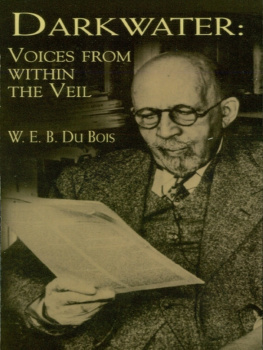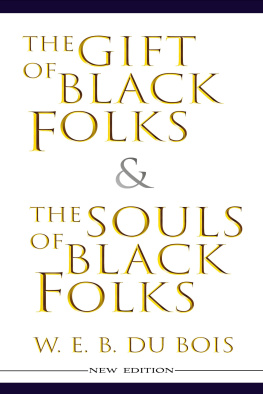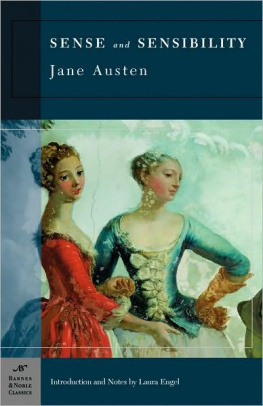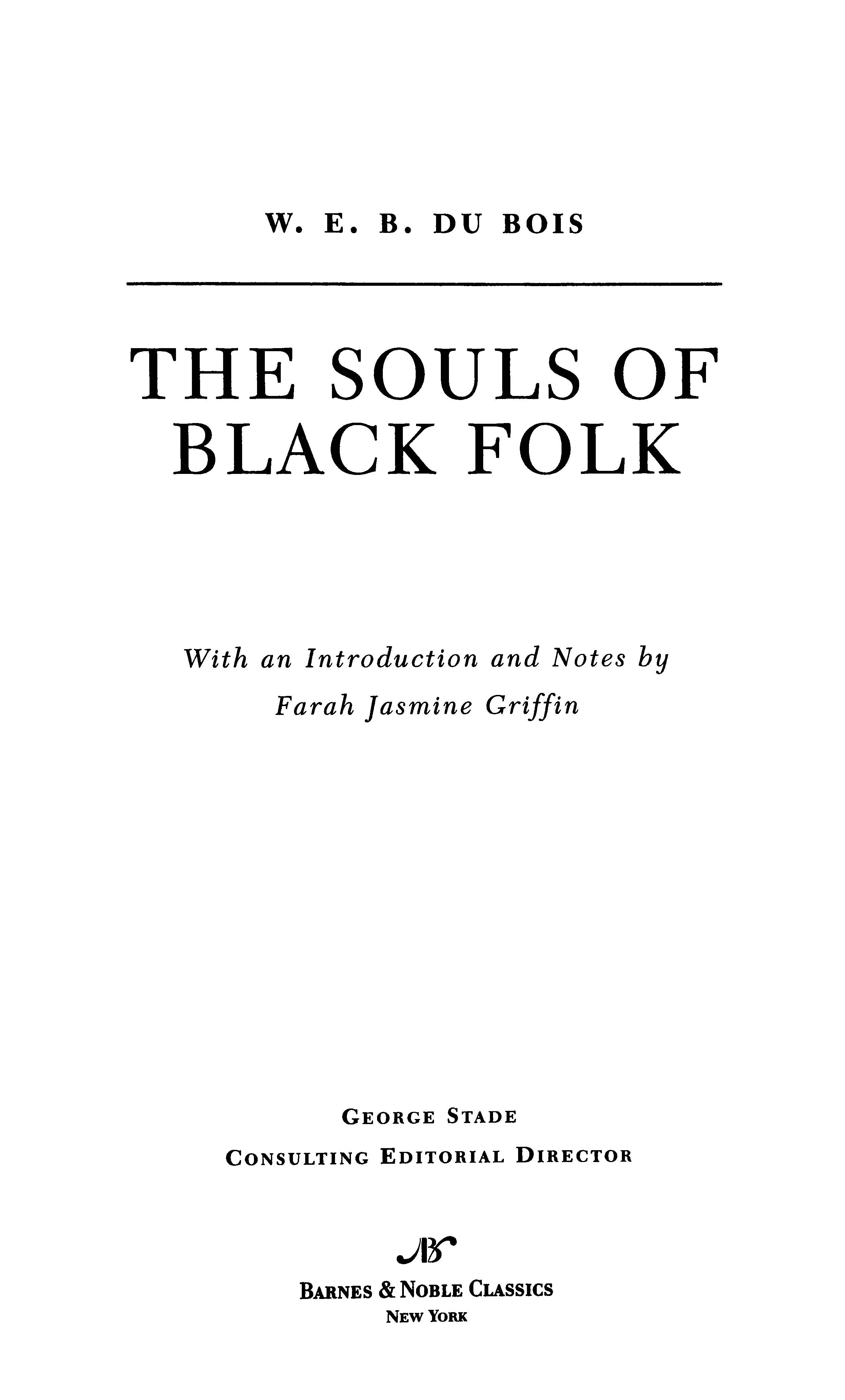
Table of Contents
FROM THE PAGES OFTHE SOULS OF BLACK FOLK
The problem of the Twentieth Century is the problem of the color-line. (page 3)
To be a poor man is hard, but to be a poor race in a land of dollars is the very bottom of hardships. (page 12)
We the darker ones come even now not altogether empty-handed: there are to-day no truer exponents of the pure human spirit of the Declaration of Independence than the American Negroes. (page 15)
The opposition to Negro education in the South was at first bitter, and showed itself in ashes, insult, and blood; for the South believed an educated Negro to be a dangerous Negro. (page 29)
In the midst, then, of the larger problem of Negro education sprang up the more practical question of work, the inevitable economic quandary that faces a people in the transition from slavery to freedom, and especially those who make that change amid hate and prejudice, lawlessness and ruthless competition. (page 70)
There stand in the South two separate worlds; and separate not simply in the higher realms of social intercourse, but also in church and school, on railway and street-car, in hotels and theatres, in streets and city sections, in books and newspapers, in asylums and jails, in hospitals and graveyards. (page 72)
We seldom study the condition of the Negro to-day honestly and carefully. It is so much easier to assume that we know it all. Or perhaps, having already reached conclusions in our own minds, we are loth to have them disturbed by facts. (page 99)
America is not another word for Opportunity to all her sons. (page 104)
Some day the Awakening will come, when the pent-up vigor of ten million souls shall sweep irresistibly toward the Goal, out of the Valley of the Shadow of Death, where all that makes life worth livingLiberty, Justice, and Rightis marked For White People Only. (page 146)
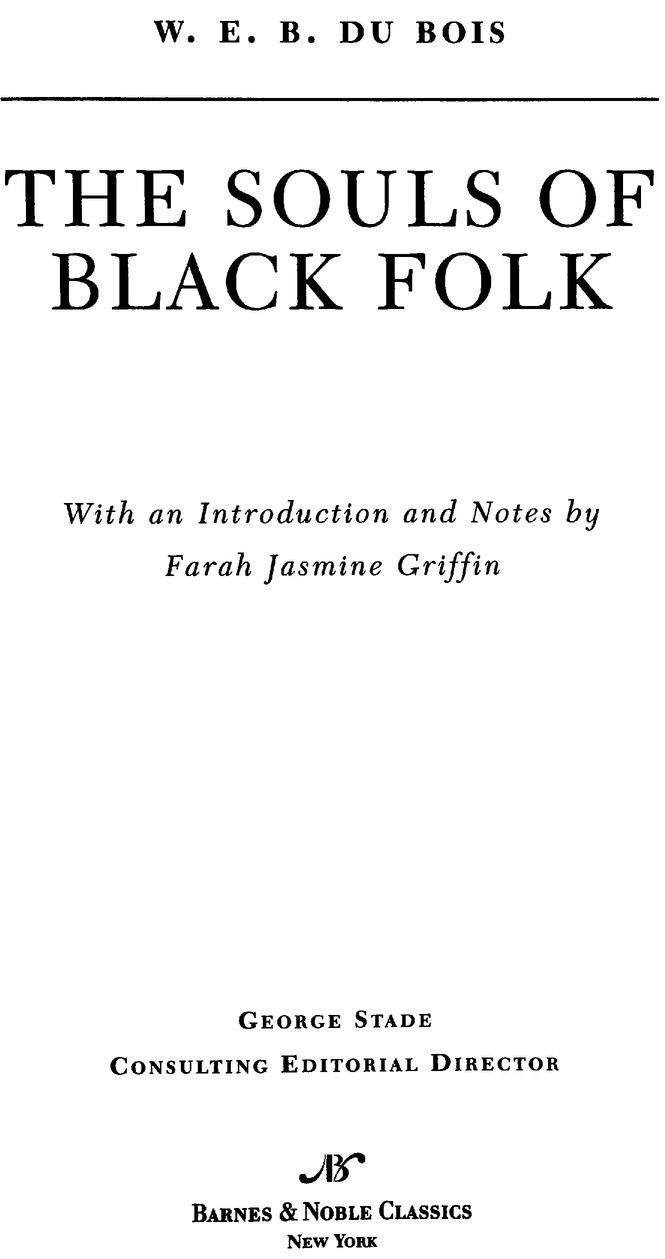
W. E. B. DU BOIS
William Edward Burghardt Du Bois was born on February 23, 1868, in Great Barrington, Massachusetts. His father left shortly after his birth, and Du Bois was raised by his mother and grew up in New England. While in high school, he excelled in academics and reported for New York newspapers, and began to discover the social inequities that blacks were expected to accept. Under the guidance of his high school principal, Du Bois won a scholarship to Fisk University, the countrys preeminent black university, where he developed an interest in African-American history. He earned a second bachelors degree at Harvard University, then pursued graduate studies in African-American history at Harvard, devoting himself to the study of black culture in America.
Du Bois was the first African American to receive a Ph.D. from Harvard. His doctoral thesis, The Suppression of the African Slave Trade, was published as a book in 1896, and in 1899 he published The Philadelphia Negro, the first sociological study of African Americans. Du Boiss belief that social science could help us find answers to the question of race and the problem of the color-line led him to publish, between 1897 and 1903, a series of significant essays in a range of widely read periodicals. He taught sociology at the University of Pennsylvania and economics and history at Atlanta University in Georgia.
In the early years of the twentieth century, when the topic of civil rights for blacks was already part of the national discourse, Du Boiss view of what was best for the movement met with opposition from various groups, both white and black. Among his black ideological contenders was Booker T. Washington, founder of the Tuskegee Institute, whose gradualist policy clashed with Du Boiss demand for immediate equal rights, regardless of race or gender. Despite the differences of opinion within the movement, over the course of Du Boiss lifetime substantive change occurred. In 1909 Du Bois co-founded the National Association for the Advancement of Colored People; he served as its director of publicity and research and the editor of its magazine, The Crisis.
Du Bois realized that integration and social equity for blacks would not happen quickly in the United States, and he grew increasingly disenchanted with America. He joined the Communist Party in 1961 and subsequently renounced his U.S. citizenship. A chance to leave the country came when Ghanas President Kwame Nkrumah invited Du Bois to move to Ghana and edit the Encyclopedia Africana. Du Bois settled in the city of Accra, where he spent his final years. Six months after becoming a citizen of Ghana, he died, on August 27, 1963.
W. E. B. Du Bois is remembered as a leading civil rights leader of the first half of the twentieth century. With his groundbreaking treatise The Souls of Black Folk, published in 1903, he intended to reveal the strange meaning of being black here in the dawning of the Twentieth Century. On the day after Du Boiss death, as the March on Washington began, Martin Luther King, Jr., eulogized him as a pioneer for civil rights. Du Bois left a political and social legacy that continues today, and his works are a vital part of American studies.
THE WORLD OF W. E. B. DU BOISAND THE SOULS OF BLACK FOLK
| 1865 | The Civil War ends, and the Thirteenth Amendment to the U.S. Constitution abolishes slavery. In the South, implementation of racial segregation, or Jim Crow laws, begins. The Freedmens Bureau is established to protect the economic interests of the freed slaves. |
| 1866 | The first branch of the Ku Klux Klan is established in Pulaski, Tennessee. The American Missionary Association establishes Fisk University in Nashville, Tennessee, for former slaves. |
| 1867 | When most southern states refuse to ratify the proposed Fourteenth Amendment, designed to protect the rights of black citizens, Congress passes the Reconstruction Acts, which divide the South into five jurisdictions and require new state constitutions to include universal manhood suffrage. |
| 1868 | William Edward Burghardt Du Bois is born on February 23 in Great Barrington, Massachusetts, to Alfred Du Bois and Mary Silvina Burghardt. Soon after his birth, Alfred leaves home, and William is raised mostly by his mother. The Fourteenth Amendment to the Constitution grants the freed slaves citizenship and guarantees their civil rights. |
| 1870 | The Fifteenth Amendment gives black men the right to vote. |
| 1880 | While attending Great Barrington High School, Du Bois works as the western Massachusetts correspondent for the New York Age, the New York Globe, and the Springfield Republican. |
| 1881 | Booker T. Washington founds the Tuskegee Institute in Alabama ; the school emphasizes industrial training as a way for blacks to gain economic independence. |
| 1884 | Du Bois graduates as valedictorian of his class and wins a scholarship to Fisk University. |
| 1885 | He enrolls at Fisk and serves as editor of the Fisk Herald, the college newspaper. His summer job teaching in the school districts of rural Tennessee exposes him to the reality of the Jim Crow laws and sparks in him an interest in civil rights. He receives his Bachelor of Arts degree in 1888. |
| 1888 | Du Bois enters Harvard University as a junior. |



